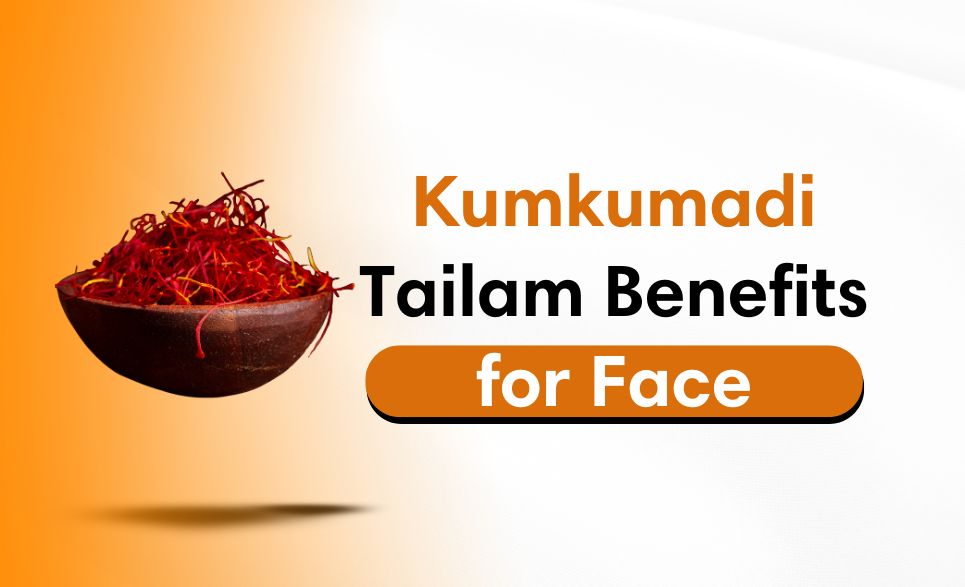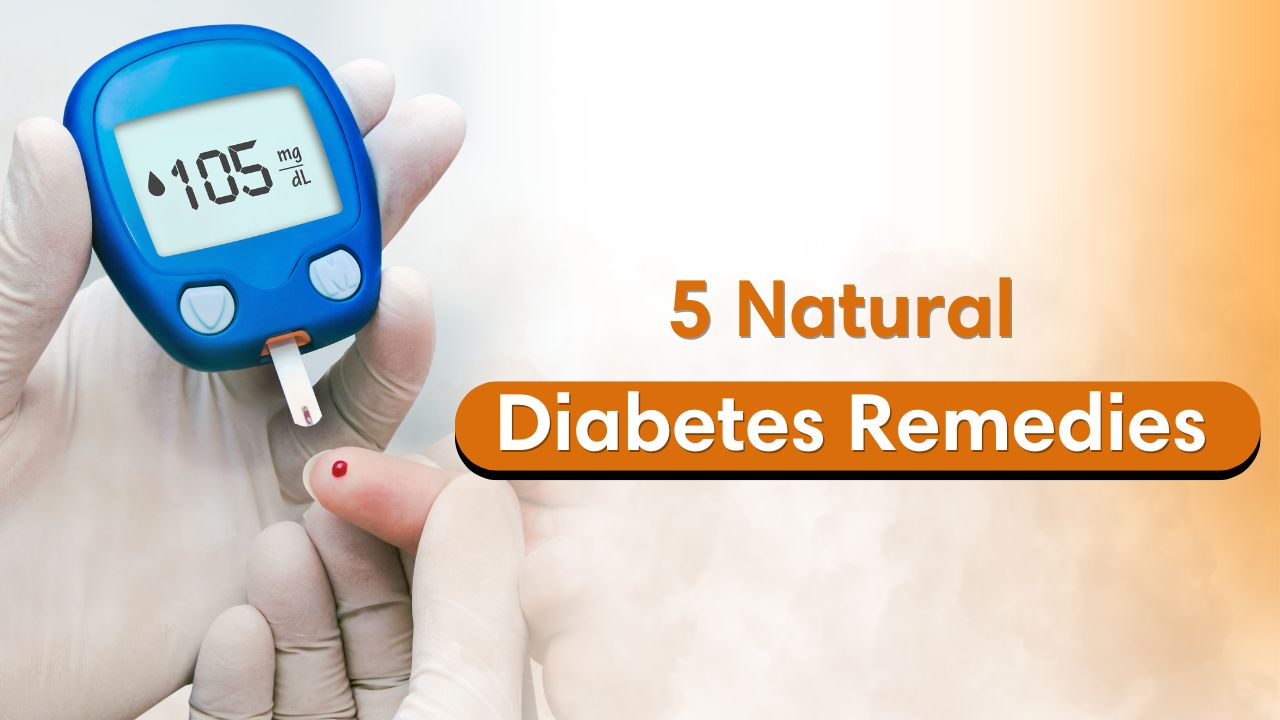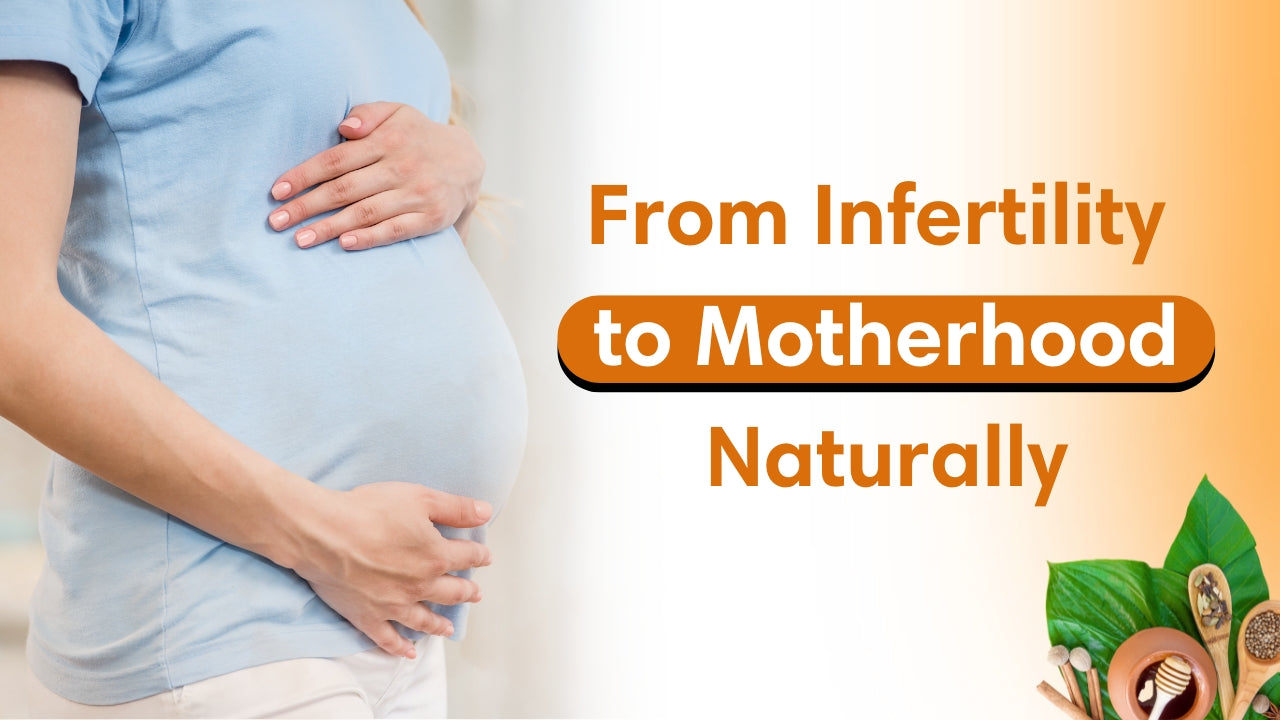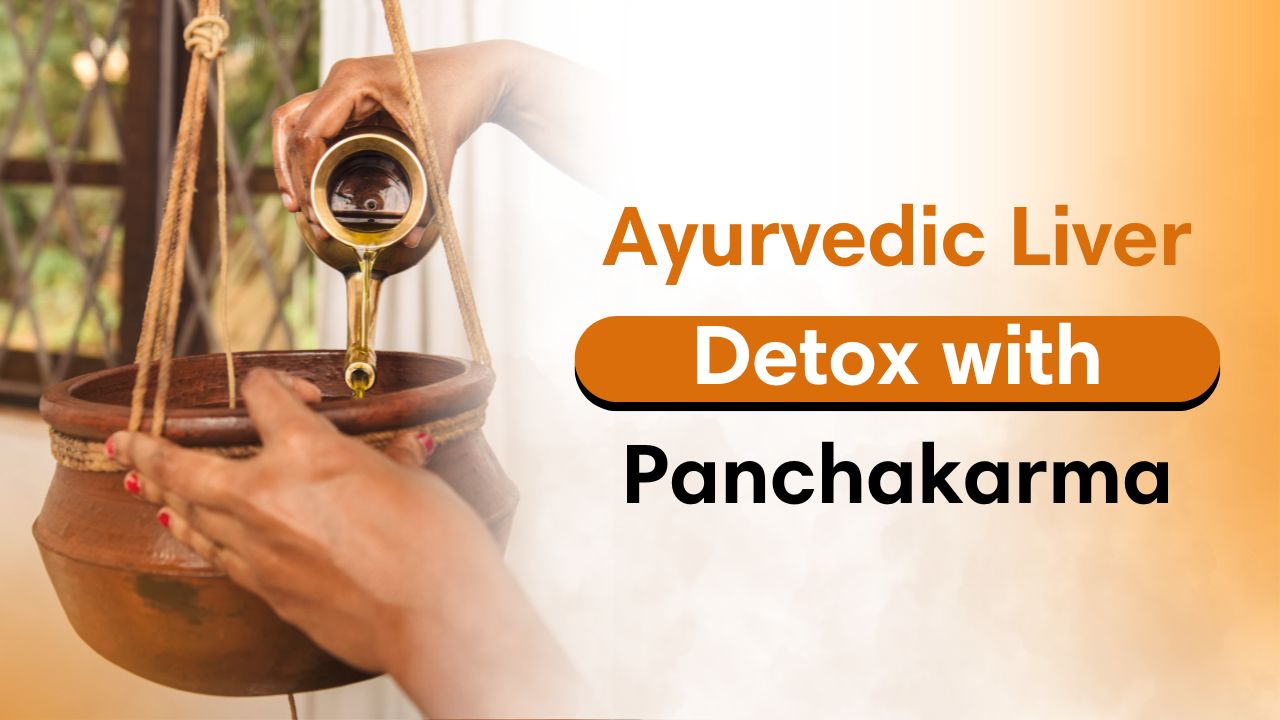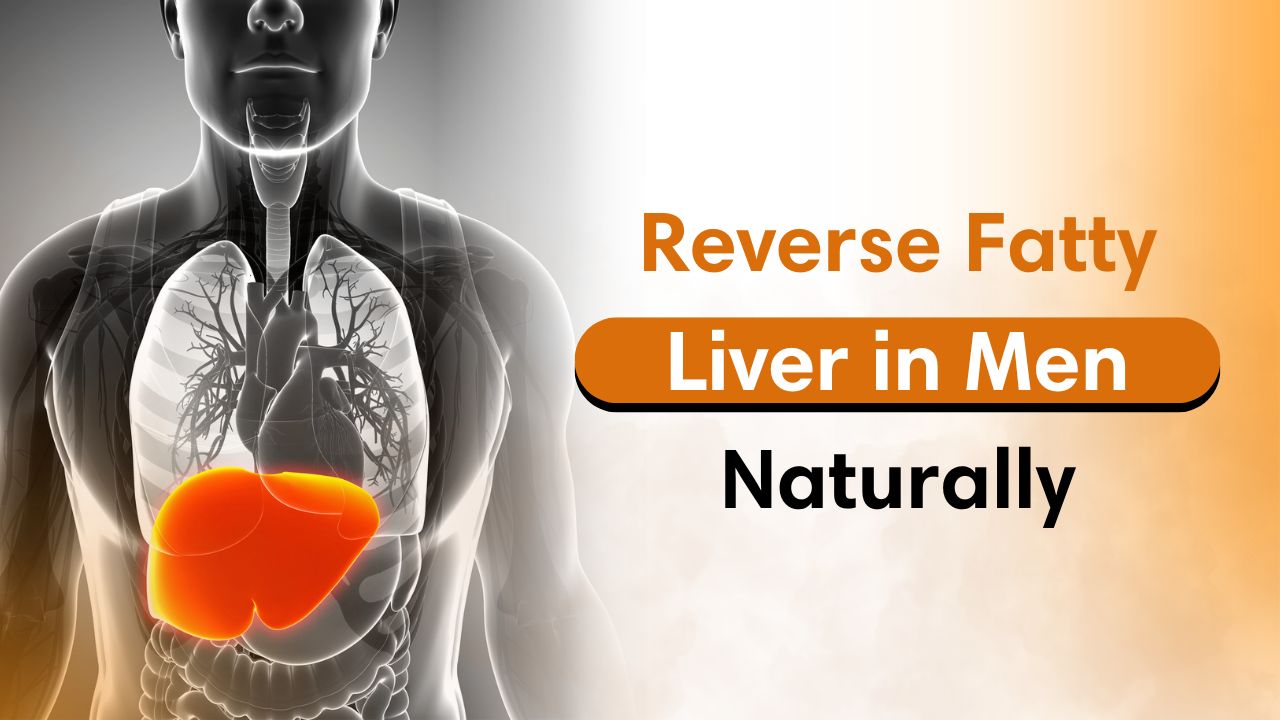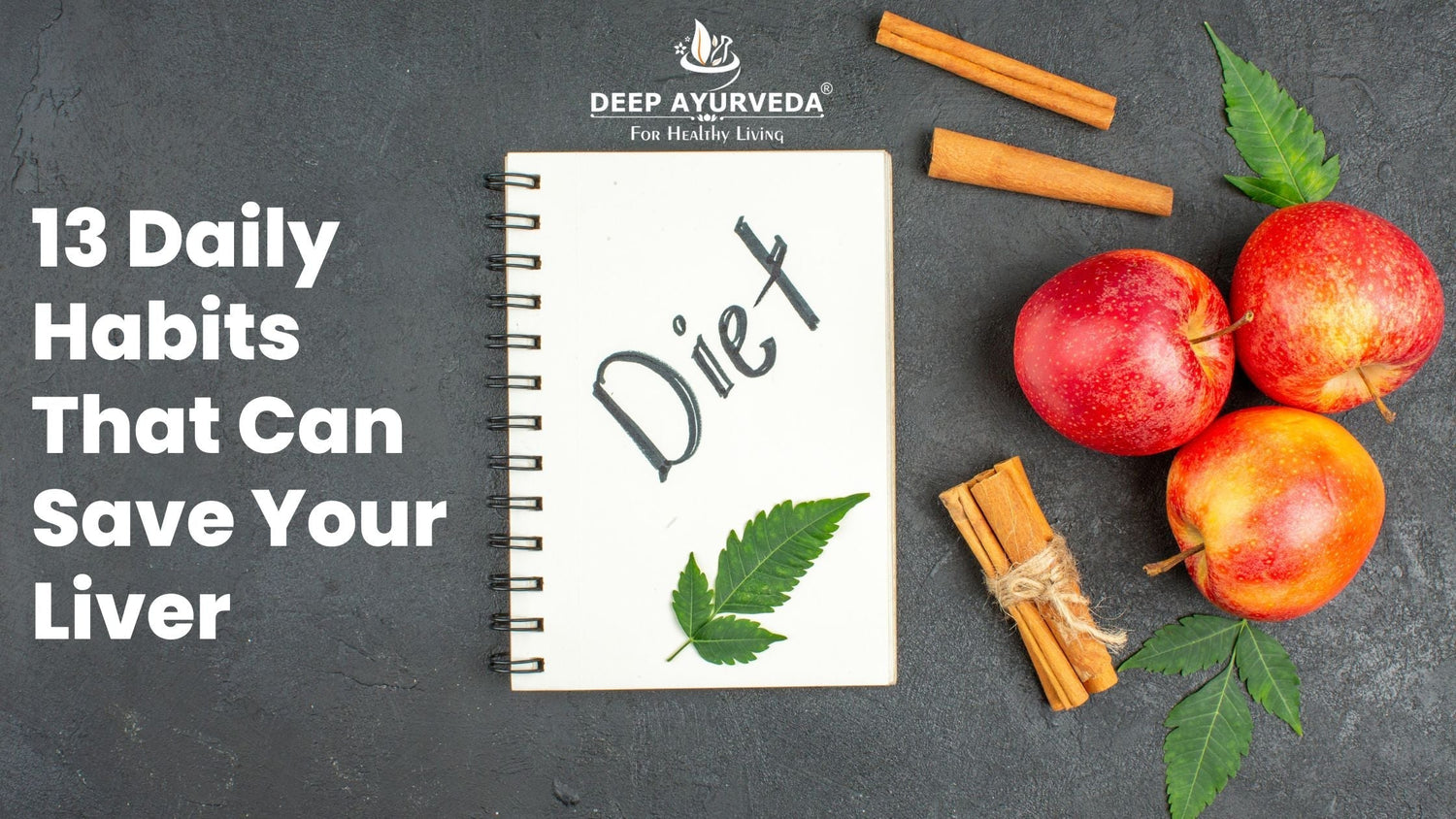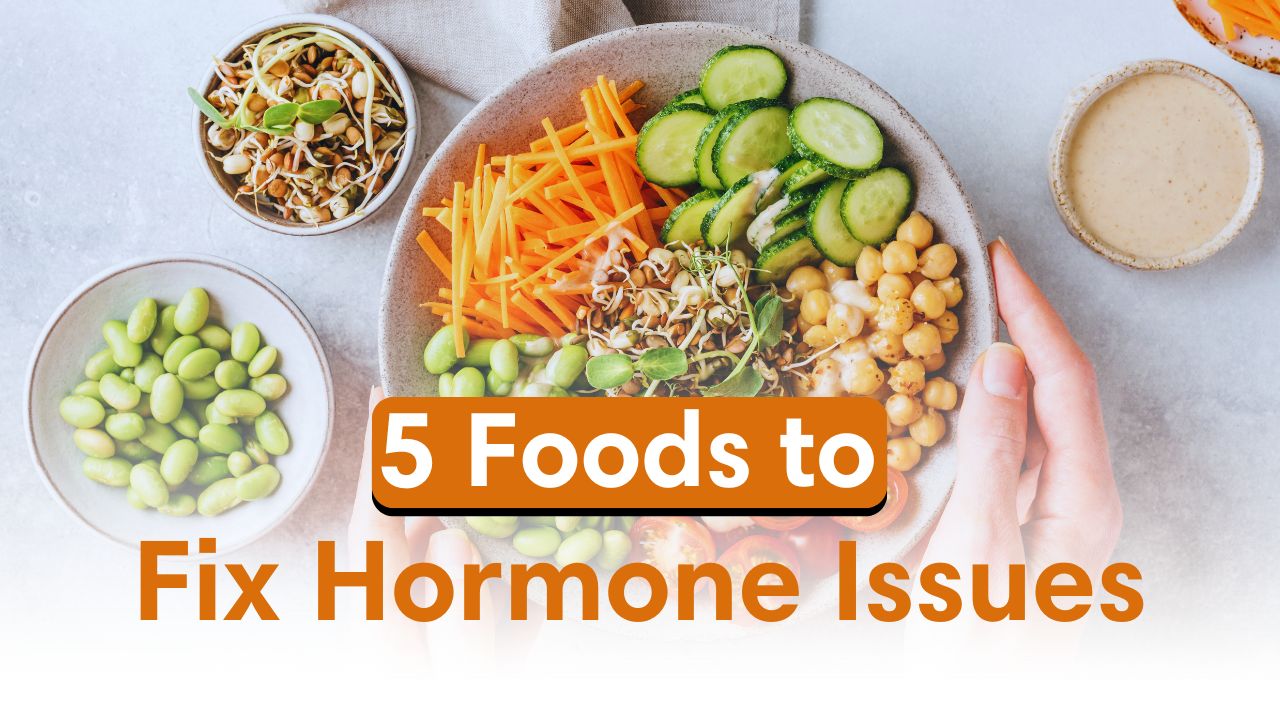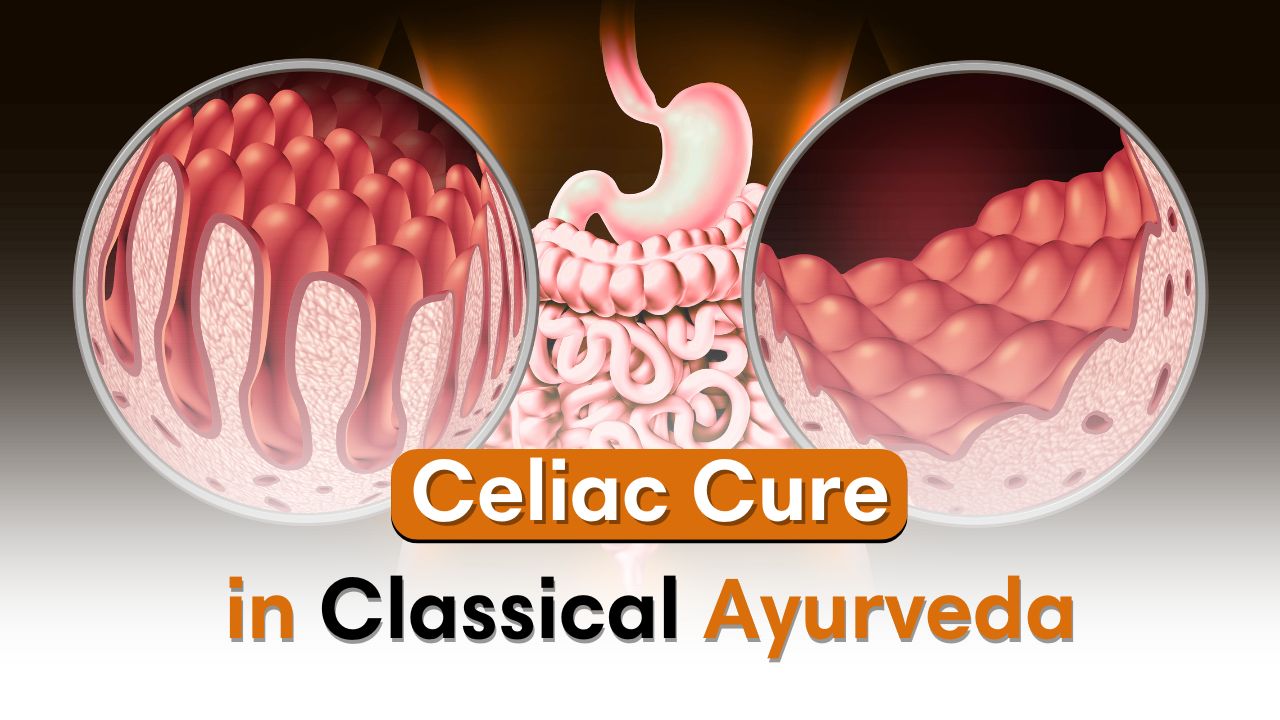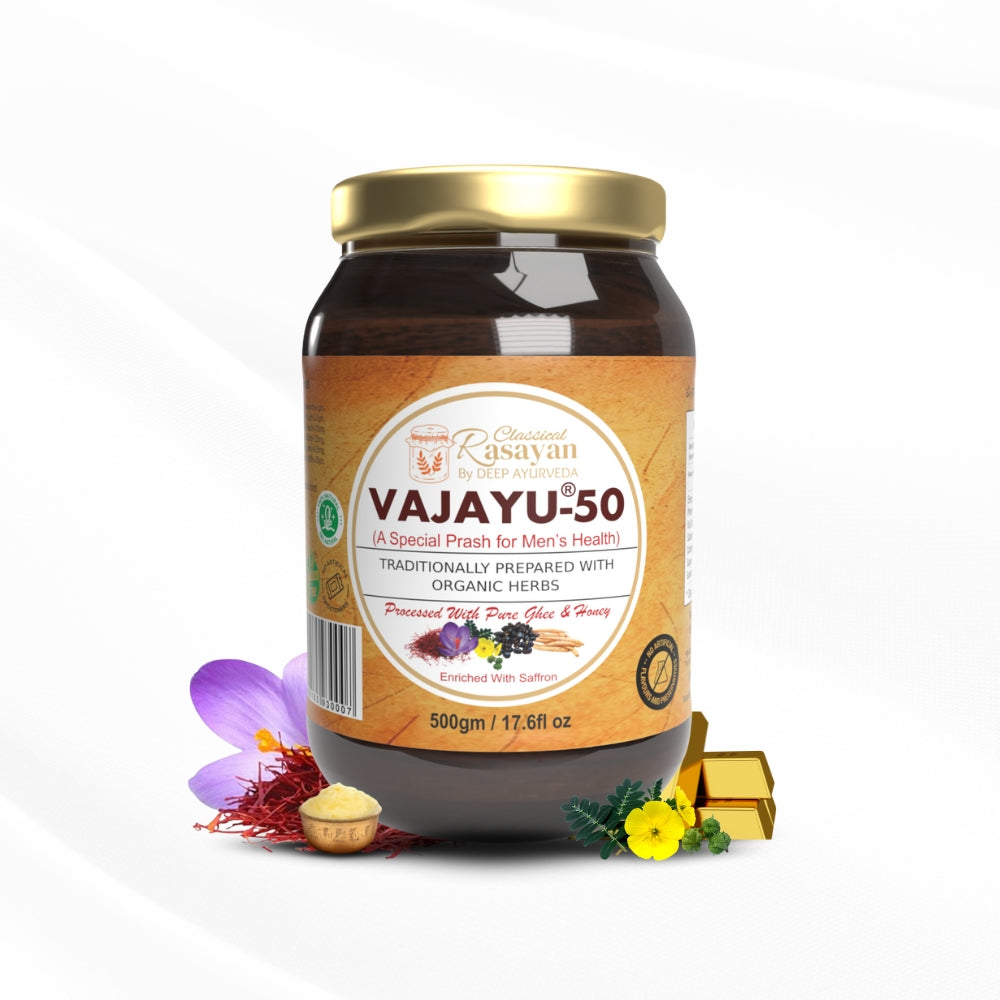News
Kumkumadi Tailam Benefits for Face, Pigmentation & Dark Spots
In today’s fast-paced lifestyle, many women face common skin issues such as pigmentation, dark spots, uneven skin tone, acne scars, and dullness. These concerns are often worsened by sun exposure, pollution, hormonal imbalances, and stress. Kumkumadi Tailam, a classical Ayurvedic formulation, offers a natural and effective solution for these skin problems. What is Kumkumadi Tailam? Kumkumadi Tailam is a classical Ayurvedic formulation traditionally used for enhancing skin complexion, reducing pigmentation, and promoting youthful, radiant skin. It is mentioned in Ayurvedic texts like "Ashtanga Hridaya" and "Bhaishajya Ratnavali" under the "Kshudra Roga" or "Mukha Roga" (minor skin diseases or facial disorders) treatment. "कुङ्कुमादि तैलं वर्ण्यं त्वग्दोषहराय च।" Bhaishajya Ratnavali – Chapter: Mukha Rogadhikara Kumkumadi oil improves complexion and helps in treating skin disorders. ✅ Classical Ingredients of Kumkumadi Tailam (कुङ्कुमादि तैलम्) No. Sanskrit Name Botanical/English Name Function 1 Kumkuma Saffron (Crocus sativus) Complexion enhancer 2 Laksha Lac (Laccifer lacca) Skin healing 3 Manjistha Indian Madder (Rubia cordifolia) Blood purifier 4 Chandana Sandalwood (Santalum album) Cooling, complexion 5 Padmaka Wild Himalayan Cherry (Prunus cerasoides) Glow and texture 6 Ushira Vetiver (Vetiveria zizanioides) Soothing 7 Madhuyashti Licorice (Glycyrrhiza glabra) Brightening 8 Sariva Anantmool (Hemidesmus indicus) Detoxifier 9 Nyagrodha Banyan (Ficus benghalensis) Skin repair 10 Udumbara Cluster Fig (Ficus racemosa) Skin healing 11 Ashvattha Peepal (Ficus religiosa) Skin toner 12 Plaksha Wavy-leaved fig (Ficus lacor) Cleanser 13 Kamala kesara Lotus Stamen (Nelumbo nucifera) Glow enhancer 14 Neelotpala Blue Lotus (Nymphaea stellata) Cooling 15 Patanga Sappan wood (Caesalpinia sappan) Complexion support 16 Kaliya Indian Indigo (Indigofera tinctoria) Skin support 17 Daruharidra Tree Turmeric (Berberis aristata) Anti-pigmentation 18 Yashtimadhu Licorice (Glycyrrhiza glabra) Soothing 19 Dashamoola Ten Roots Group Anti-inflammatory 20 Go dugdha Cow’s Milk Skin nourishment 21 Aja Dugdha Goat’s Milk Moisturizing, softening 22 Til Taila Sesame Oil (Sesamum indicum) Base oil 23 Siddhartha Taila Synonym of Sesame Oil Nourishing 24 Kamalakshara Lotus Alkali Skin clarifying 25 Shweta Chandana White Sandalwood Skin cooling 26 Rakta Chandana Red Sandalwood Skin brightening 27 Nagkesar Ceylon Ironwood (Mesua ferrea) Astringent 28 Kasturi (optional) Musk (Traditionally used, now replaced by plant-based alternatives) Fragrance 29 Haridra Turmeric (Curcuma longa) Antibacterial 30 Kumari Aloe vera Juice Skin healing (used in modern variants) Benefits of Kumkumadi Tailam 1. Reduces Pigmentation and Dark Spots 2. Brightens the Complexion 3. Fights Signs of Aging 4. Improves Skin Texture 5. Treats Acne Scars and Blemishes 6. Hydrates and Nourishes How to Use Kumkumadi Tailam for Best Results Night Application: Cleanse your face, take 2–3 drops of oil, and gently massage it into your skin. Leave overnight and wash off in the morning. Importance of kesar(kumkum) in Kumkumadi tailam "कुङ्कुमं वर्न्यं..." Bhaishajya Ratnavali – Mukha Roga Chikitsa: (Kumkuma is Varnya – complexion-enhancing) In Kumkumadi Tailam, saffron is the primary "Varnya Dravya" used for: Enhancing complexion Reducing pigmentation Giving a radiant glow to the skin Conclusion Kumkumadi Tailam is a treasured gift from Ayurveda that offers a natural, holistic solution to pigmentation, dark spots, and dull skin. With consistent use and the right skincare routine, it can restore your skin’s youthful glow and even tone — the Ayurvedic way.Kumkumadi tail can be positioned as a luxurious Ayurvedic skincare formulation designed for daily facial application—especially for concerns like pigmentation, dark spots, uneven skin tone, dullness, and aging.
Read moreNews
5 Powerful Ayurvedic Remedies for Diabetes: Natural Blood Sugar Control
Managing diabetes naturally has gained popularity in recent years, and Ayurveda—India’s ancient system of medicine—offers time-tested solutions. With the rise in lifestyle-related disorders like type 2 diabetes, many are turning to Ayurvedic remedies for diabetes to stabilize blood sugar and improve overall well-being. In this blog, we’ll explore 5 effective Ayurvedic remedies for diabetes that are easy to incorporate into your daily routine. These remedies focus on balancing your body's doshas, especially Kapha and Vata, which are often linked to diabetes in Ayurveda. 1. Bitter Gourd (Karela Juice) One of the most effective natural diabetes treatments, Karela (Bitter Gourd) is known for its blood sugar-lowering properties. It contains polypeptide-p, a compound that mimics insulin and helps regulate glucose levels naturally. How to use: Drink 30–50 ml of fresh karela juice on an empty stomach every morning. Combine with a pinch of turmeric for enhanced benefits. 2. Fenugreek Seeds (Methi Dana) Rich in soluble fiber, fenugreek seeds help slow down carbohydrate digestion and sugar absorption, promoting better blood sugar control in Ayurveda. How to use: Soak 1 tablespoon of fenugreek seeds overnight in water. Drink the water and chew the seeds in the morning. 3. Amla (Indian Gooseberry) Packed with vitamin C and powerful antioxidants, amla is a rejuvenating fruit that helps strengthen the pancreas and regulate insulin production. How to use: Mix 1 teaspoon of Amla juice with ½ teaspoon of turmeric and consume daily. You can also take it in powdered form or as a part of Triphala churna. 4. Gudmar (Gymnema Sylvestre) Also known as the “sugar destroyer,” Gudmar helps reduce sugar cravings and regenerates pancreatic cells. It’s a staple in many Ayurvedic formulations for type 2 diabetes treatment. How to use: Take 300–400 mg of Gudmar extract daily after meals (consult an Ayurvedic practitioner for dosage). It’s also available in capsule or powder form. 5. Neem Leaves Known for its detoxifying and blood-purifying qualities, neem helps in reducing insulin resistance and supports natural blood sugar balance. How to use: Chew 4–5 fresh neem leaves every morning. Alternatively, neem powder or neem juice can be taken as supplements. Neem is often recommended in Ayurveda for blood sugar control, especially in combination with other herbs like turmeric and amla. Final Thoughts Ayurveda offers a holistic and sustainable approach to diabetes management by addressing the root cause and not just the symptoms. Along with these Ayurvedic remedies for diabetes, maintaining a balanced diet, regular exercise, stress management, and proper sleep are crucial for long-term wellness. If you're considering natural diabetes treatment, always consult with a qualified Ayurvedic practitioner to ensure the remedies are personalized and safe for your body type.
Read moreHigh Blood Pressure and Cholesterol in Men: 10 Warning Signs You Shouldn’t Ignore
High blood pressure and cholesterol often go unnoticed but can silently damage the heart, brain, and kidneys. This blog explores 10 warning signs every man should know and offers natural solutions through Ayurvedic herbs, diet, and lifestyle changes. Learn how products like Da Cardion by Deep Ayurveda can support your heart health safely and effectively.
Read moreUnderstanding Pregnancy-Related Disorders: A Complete Guide for Expecting Mothers
Pregnancy is a beautiful and transformative phase in a woman’s life, marked by the development of a new life within her womb. During this period, the mother’s body undergoes significant adaptations to support the growth and nourishment of the fetus. Hormonal changes and increased physiological demands during pregnancy can lead to Disorders such as gestational diabetes, preeclampsia, anemia, hyperemesis gravidarum (excessive vomiting), urinary tract infections, and placenta previa. With its individualized and preventive care approach, Ayurveda helps in minimizing complications and promoting a safe and healthy pregnancy. Common Pregnancy-Related Disorders Morning Sickness (Hyperemesis Gravidarum)-A common symptom experienced by many women during the first trimester in which female feels nausea mostly during morning. It is usually caused by hormonal changes, particularly the rise in human chorionic gonadotropin (hCG) and estrogen levels. Gestational Diabetes- It is a Pregnancy-Related Metabolic Disorder. Gestational diabetes mellitus (GDM) is a type of diabetes that develops during pregnancy, typically in the second or third trimester. It is characterized by elevated blood glucose levels due to insulin resistance caused by hormonal changes. Pre-eclampsia and Eclampsia-It is also known as gestational hypertension, is a condition characterized by elevated blood pressure (≥140/90 mmHg) that develops after the 20th week of pregnancy in women . Anemia in Pregnancy- It is characterized by a reduced number of healthy red blood cells, leading to decreased oxygen delivery to the body’s tissues. Common symptoms include fatigue, weakness, pale skin, shortness of breath, and dizziness. If left untreated, anemia can increase the risk of preterm birth, low birth weight, and postpartum complications. Urinary Tract Infections (UTIs)-Urinary Tract Infections (UTIs) are common during pregnancy due to hormonal changes and the pressure of the growing uterus on the bladder. Thyroid Imbalances-Thyroid imbalance during pregnancy is mainly due to the increased hormonal and metabolic demands placed on the mother’s body Placenta Previa-Placenta previa is a condition where the placenta partially or completely covers the cervix, the opening of the uterus. This abnormal positioning can lead to painless vaginal bleeding, especially in the second or third trimester, and poses risks during delivery as the placenta may block the baby’s exit path. It can result in complications such as preterm birth, placental abruption, or excessive bleeding during labor, necessitating a cesarean delivery in most cases. Garbhini Vikar-Ayurveda View "गर्भिणी व्यापारो नाम ते रोगाः ये गर्भिण्यां जायन्ते।" Those disorders that occur specifically in a pregnant woman are termed Garbhini Vyapada). 1)Garbhini Chardi(Hyperemesis Gravidarum) Garbhini Chardi refers to nausea and vomiting experienced by a pregnant woman, commonly occurring during the first trimester. In Ayurveda, this is symptom due to dosha imbalance, primarily Pitta and Vata, during the early stages of pregnancy. Ayurvedic management- Ela (Cardamom) – Soothes nausea Lavanga (Clove) – Anti-emetic Draksha (Raisins) soaked in water overnight Kamdugha Ras with Mukta Sutshekhar Ras Draksha Avaleh Dadimadhya ghrit Madiphala Rasayana 2)Garbhhini Pandu(Anemia during Pregnancy) Garbhini Pandu refers to anemia occurring during pregnancy, as explained in Ayurveda. It is considered a pregnancy-related disorder (Garbhini Vyapad) caused by the vitiation of Pitta dosha along with Rasa and Rakta Dhatu kshaya (deficiency of plasma and blood tissues). This condition leads to reduced Ojas, weakness in the mother, and improper fetal nourishment. Ayurvedic Management- Punarnavadi mandoor Dhatri loh Tapyadi loh Navayas loh Dadimadhya ghrit 3)Kikkish(Stretch Marks During Pregnancy Kikkisa are thin, reddish-black or bluish streaks appearing on the abdomen and breasts during pregnancy. Ayurveda Managment- Lepam of manjistha and mrinal chandan Churn of shirish ,dhatki,sarshap Oil abhyang with kumkumadi tail 4)Garbhini Madhumeha In Ayurveda, it is understood under the broader spectrum of “Prameha”, and during pregnancy, it's specifically referred to as “Garbhinī Madhumeha”—a condition arising due to the imbalance of Kapha dosha, associated with metabolic disturbances and Rasa-Rakta Dhatu dushti (impairment of bodily fluids and blood). Herbs for managing gestational madhumeh- Nishaamlaki Gudmar (Gymnema sylvestre) – Reduces sugar absorption Methi (Fenugreek) – Enhances insulin sensitivity Amalaki (Emblica officinalis) – Rasayana and antioxidant Neem, Haridra (Turmeric) – Bitter herbs to pacify Kapha 5)Placenta Previa -Ayurveda View Although the term placenta previa is not directly mentioned in classical Ayurvedic texts, it can be functionally correlated with Apanavayu dushti – Vitiation of Apana Vata, which governs downward movement and pregnancy maintenance. It can also be correlated to Garbhasrava (गर्भस्रव) – Threatened miscarriage Garbhapata (गर्भपात) – Abortion Raktayoni (रक्तयोनि) – Vaginal bleeding Ayurveda sees such bleeding conditions as arising due to vitiation of Rakta (blood) and Pitta dosha, often along with Apana Vata disturbance. Ayueveda Management- Strict rest: Complete bed rest is recommended. Avoid travel, heavy lifting, or stress. Left lateral position for sleeping is preferred to increase uterine blood flow. Light, digestible, and nourishing foods to strengthen rasa and rakta dhatu should be taken Including Milk, ghee, dates, coconut water, Shatavari Ksheerapaka which strengthens uterus and nourishes fetus. 6)Eclampsia-Garbhini Soth In Ayurveda it can be correlated with garbhini soth due to vitiation of kaph dosh wiith symptoms like Swelling in ankles, legs, or face ,Feeling of heaviness or tightness,Fatigue or dullness. Ayurvedic Management-Foot massage with medicated oils like Dashamoola Taila-Lie down on a firm surface (like a yoga mat or bed).Use a soft pillow or folded towel under your legs.Elevate your legs so that ankles are 6–12 inches above the level of the heart. Garbhini Paricharya Garbhini Paricharya refers to the Ayurvedic antenatal care regimen—a structured monthly diet, lifestyle, and herbal guidance provided to a pregnant woman to ensure the health of the mother and the proper growth of the fetus. Objectives of Garbhini Paricharya: Maintain maternal health Ensure proper growth of the fetus Prevent pregnancy-related complications Prepare the mother for normal labor Month-Wise Garbhini Paricharya Month Dietary Recommendations Medications (if needed) 1st Month Milk with small amounts of ghee; light, liquid food Siddha Ghrita, cold milk 2nd Month Milk with herbs like Shatavari or Vidari Shatavari Ghrita 3rd Month Milk with rice gruel (Yavagu), sweet and nourishing foods Sukumara Ghrita 4th Month Butter, milk with medicated gruel; fetal organ development stage Phalaghrita, Kalyanaka Ghrita 5th Month Ghee with rice, milk; light, cooling, nutritious diet Brahmi Ghrita 6th Month Start snigdha & brimhani (nourishing) food; more ghee & milk Ashwagandhadi Lehyam 7th Month Sweet liquids, medicated ghee, avoid exertion Begin Yoni Pichu with Bala Taila 8th Month Rice gruel with ghee, use of oil massage (Abhyanga) Yoni Pichu, Mridu Basti if required 9th Month Light but strengthening diet, oil massage, swedana Yoni Abhyanga, Basti, Sukha Prasava Yoga (easy delivery decoctions) Conclusion- By focusing on dosha balance, proper diet (ahara), lifestyle (vihara), and monthly antenatal care (Garbhinī Paricharyā), Ayurveda not only addresses the root cause of complications but also promotes the health and well-being of both mother and fetus.
Read moreFemale Infertility: A Holistic Ayurvedic Journey to Motherhood
The WHO (World Health Organization) that approximately 1 in 6 people globally experience infertility in their lifetime. Infertility rates generally increase with age, especially in women, where the quality and quantity of eggs decline with age. Infertility or Bandhyatva Infertility is defined as the inability to conceive a pregnancy after 12 months of regular, unprotected intercourse. It can be primary (if the woman has never conceived) or secondary (if she has conceived before but is now unable to conceive). In Ayurveda, infertility is referred to as Vandhyatva (वन्ध्यत्व). It is defined as: "आर्तवदोषाद् वा योनिदोषाद् वा गर्भाशयावरणाद् वा न गर्भं धारयति सा वन्ध्या।" चरक संहिता, चिकित्सा स्थान ३०/२०) A woman is called Vandhya (infertile) if she is unable to conceive due to: Vitiation of Artava (menstrual blood or ovum) Disorders of the Yoni (reproductive tract) Obstruction in the Garbhashaya (uterus) Causes of Infertility in Females- Hormonal Imbalance Low egg quality or small size follicles Polycystic Ovary Syndrome (PCOS) Uterine Fibroids Tubal Blockage Low AMH Level Lifestyle Factors like Stress, smoking, alcohol, excessive exercise,Obesity or being underweight,Nutritional deficiencies Bandhyatva Nidan- According to Ayurveda, successful conception (Garbhasambhava) requires the proper functioning of four factors: Ritu (Fertile period) Kshetra (Healthy uterus) Ambu (Proper nutrition or rasa dhatu) Beeja (Healthy ovum and sperm Other causes- Dosha Imbalance(mainly pitt dosh vitiliation causes bandhyatva) artav vah strotodusthi(menstrual cycle disturbance) Ahar-Viharaja Factors (Diet and Lifestyle) Manasika Nidana (Psychological Factors) Types of Vandhyatva (Infertility) in Ayurveda "सप्तधा वन्ध्या प्रोक्ता दोषतो गर्भनाशनात्। पुंसो दुष्टात् स्त्रियाश्चैव गर्भाशयापवर्तनात्॥ स्राविणी च क्षतार्तव्या पुष्यन्ती चापि रक्तिनी। एता वन्ध्या भवत्येव सप्तधा नात्र संशयः॥"— हरित संहिता, स्त्रीरोगाधिकार, अध्याय 2 Dosaja Bandhya-due to imbalance of doshas Stridusta-due to any disorder in female reproductive system, Garbhasayapavrttta-due to misplaced uterus from its position for eg in uterine prolapse Garbhanasaja- due to recurrent miscarriages Pumsodusta- due to male sperm deformities Sravini- Heavy or prolonged bleeding (menorrhagia type infertility)। Ksataatavya- when body Fails to nourish the embryo after conception, leading to early miscarriage or infertility. Modern Techniques for Female Infertility Ovulation Induction- Stimulate ovulation in women who do not ovulate regularly or at all. Intrauterine Insemination (IUI)-processed (washed) sperm is injected into the uterus during ovulation. In Vitro Fertilization (IVF)-Eggs are retrieved from the ovaries and fertilized in the lab. The resulting embryo is then transferred into the uterus.7. 4)Surrogacy-Embryo is created using the intended parents’ or donors’ gametes and implanted into a surrogate mother. Holistic Ayurvedic Approach to Female Infertility Ayurveda not only treats Infertility it also enhance fertile health of a female through beej suddhi hence not only infertile couples but a normal couple without any cause of infertility planning for baby should go for beej suddhi for a better progeny. Ayurveda adopts a comprehensive treatment plan involving herbal medicines, Panchakarma therapies, diet corrections, yoga, and stress management. 1)Sodhan Chikitsa- Detoxification treatments help remove deep-rooted toxins (ama) and restore reproductive health: Vamana (Therapeutic emesis) – Removes excess Kaph .In condition like PCOD, Obesity, tubal blockage vaman plays a significant role. Virechana (Therapeutic purgation) –.Vitiation of pitt dosh is a main causative factor for Infertility in maximum females and also causes recurrent Miscarriages in many females as due to excessive heat garbhasya is unable to hold the fetus..Virechan plays a significant role in such condition by balancing the excessive pitt from body. Nasya(administration of medicated oil through nose)-Nasya stimulates the hypothalamus-pituitary-ovarian (HPO) axis by acting through the nasal-brain connection. This can regulate menstrual cycles, ovulation, and hormonal imbalances. Raktmokshan-blood detoxification should be done by sirabhed raktmokshan procedure where 30 40 ml blood letting is done .In females with excessive pitt in their body are at a risk of infertility so by performing raktmokshan the excessive heat in blood is removed through this procedure. Basti (Medicated enema) – Especially effective in Vata-related infertility,where Vitiation of apan vayu rajavahastrotodushti. Shirodhara- is a classical Ayurvedic therapy where a continuous stream of medicated oil, decoction, or milk is gently poured over the forehead .It plays a powerful supportive role in infertility treatment, especially when the cause is linked to Stress and anxiety, Hormonal imbalance Uttar Basti: A Powerful Ayurvedic Therapy for Uterine Health “बस्तिश्चोत्तरो यः स्यात् स्त्रीपुंसोर्भववर्जितः।”— Charaka Samhita, Siddhi Sthana Uttar Basti refers to the administration of medicated oil or decoction into the uterus (female) or urinary bladder/urethra (male) via the vaginal or urethral route Uttar basti through vaginal route is administered for the nourishment of endometrial lining of uterus. Indications of Uttar Basti in Females Bandhyatva (Infertility) Garbhasrava / Garbhapata (Recurrent miscarriages) Cervical erosion Uterine fibroids (as supportive care) Tubal blockage Procedure of Uttar Basti- Purva Karma (Pre-Procedure):Snehan (oleation) and Swedan (fomentation) of lower abdomen,Bowel and bladder should be emptiedPradhana Karma (Main Procedure):Medicated oil (2-3 ml)(phalghrit) is introduced into the vaginal canal or uterine cavity using a sterile catheter/syringe ,Usually done in the post-menstrual phase (after 5th–6th day)Pashchat Karma (Post-care):Rest for a few hours,Avoid cold, intercourse, and heavy work on the day of procedure Benefits of Uttar Basti in Women: Improves uterine tone and endometrial healthClears tubal blockages (mild) and Uterine fibroids.Enhances fertility and implantation Tubal Blockage and Uttar Basti - Tubal blockage refers to the obstruction in the fallopian tubes, which prevents the ovum from reaching the uterus or the sperm from reaching the ovum, leading to Infertility. In Modern Science Laparoscopic Surgery (Tubal Recanalization), Salpingostomy or Fimbrioplasty, Hysteroscopic Tubal Cannulation are some procedures done for tubal blockage. But through Ayurveda tubal blockage can be treated without any surgical procedures and side effects .Uttar Basti of Kshar kashish oil is done in tubal blockage ,and some lekhan aushad like triphala guggul ,is given in such patients for removal of blocakge in tubes. 2) Shaman Chikitsa- Charaka has classified 50 Mahakashayas (great decoction groups), and Garbhasthapan Mahakashaya is one among them, which promotes conception and uterine nourishment. Sanskrit Name Botanical Name Key Action 1. Shatavari Asparagus racemosus Uterine tonic, balances hormones 2. Ashoka Saraca indica Controls bleeding, strengthens endometrium 3. Lodhra Symplocos racemosa Astringent, balances Pitta-Kapha 4. Gokshura Tribulus terrestris Supports reproductive hormones 5. Bala Sida cordifolia Nourishes uterus and dhatus 6. Mustaka Cyperus rotundus Digestive, reduces toxins 7. Yashtimadhu Glycyrrhiza glabra Anti-inflammatory, endocrine regulator 8. Vidarikand Pueraria tuberosa Strengthens reproductive system 9. Kusha Desmostachya bipinnata Sacred, used in fertility rituals 10. Durva Cynodon dactylon Uterine tonic, stops excessive bleeding Classical medication for garbhadharan- Phala Ghrita Pushpadhanwa ras(for increasing egg quality and for ovulation and in cases of low AMH) Shatavri ghrit Kalyanak ghrit Dashmoolarishta Rajahpravartani vati Supari Pak Conclusion Ayurveda views infertility not as a disease but as a symptom of internal imbalance. Through a combination of detoxification, herbal treatment, lifestyle modification, and mind-body healing, Ayurveda offers a natural, safe, and holistic path to overcome infertility. With personalized treatment and patience, Ayurveda enhances not just fertility, but overall reproductive and emotional wellness.
Read moreAyurvedic Treatment for Liver Detoxification: How Panchakarma Heals from Within
The liver is the body’s natural detoxifier, playing a crucial role in filtering toxins and waste from our bloodstream. In today’s fast-paced world filled with processed foods, environmental pollutants, and stress, liver health often takes a backseat. This is where Ayurvedic treatment for liver detoxification steps in, offering time-tested holistic methods to restore liver function naturally. One of the most effective therapies is Panchakarma, the crown jewel of Ayurvedic healing. What is Panchakarma? Panchakarma, which literally means "five actions," is a set of five therapeutic treatments in Ayurveda designed to cleanse the body of toxins (Ama) and restore balance to the Doshas—Vata, Pitta, and Kapha. It not only rejuvenates the liver but also improves digestion, boosts immunity, and enhances overall vitality. The Five Panchakarma Therapies: Vamana Virechana Basti Nasya Raktamokshana Among these, Virechana is particularly effective for liver detoxification as it targets excess Pitta—the dosha most associated with liver function. Ayurvedic Treatment for Liver Detoxification Through Panchakarma When it comes to cleansing the liver, Ayurvedic treatment for liver detoxification focuses on eliminating deep-rooted toxins and balancing metabolic functions. Here's how Panchakarma helps: 1. Virechana— Virechana uses herbal laxatives to cleanse the liver and gallbladder. This purgation process removes accumulated Pitta from the body, reducing inflammation and improving bile flow. 2. Pre-Treatment: Snehana and Swedana Before the actual detox, the body is prepared with: Snehana (internal and external oleation) using medicated ghee or oils. Swedana (steam therapy) to open up bodily channels for effective toxin elimination. 3. Post-Treatment Rasayana (Rejuvenation) After detox, rejuvenating Ayurvedic herbs for liver detoxification are administered to repair and nourish liver cells. Top Ayurvedic Herbs for Liver Detoxification The power of Ayurveda lies not only in the treatments but also in the healing herbs that support liver health. Here are the most effective Ayurvedic herbs for liver detoxification: Bhumyamalaki (Phyllanthus niruri)—Regenerates liver cells and protects against hepatitis. Kutki (Picrorhiza kurroa)—Detoxifies and acts as a hepatoprotective agent. Kalmegh (Andrographis paniculata)—Reduces liver inflammation and enhances bile secretion. Triphala—a combination of three fruits that gently cleanses the liver and supports digestion. Turmeric (Curcuma longa)—a powerful anti-inflammatory and antioxidant herb. These herbs are often used in combination with Panchakarma to provide both detoxification and rejuvenation. Benefits of Panchakarma for Liver Health Deep cellular detoxification Improved bile secretion and metabolism Relief from fatty liver and liver congestion Better digestion and appetite Enhanced energy and mental clarity When to Consider Ayurvedic Liver Detox If you experience symptoms like chronic fatigue, bloating, skin issues, or frequent headaches, your liver might be under stress. An Ayurvedic treatment for liver detoxification using Panchakarma can restore balance and prevent future health complications. Conclusion Liver health is vital for overall well-being, and Ayurveda offers a natural, holistic approach to detox and rejuvenate this essential organ. By combining Panchakarma with Ayurvedic herbs for liver detoxification, you can support long-term health and vitality without harmful side effects. If you're considering a natural way to heal your liver, consult a qualified Ayurvedic practitioner to create a personalized Panchakarma detox plan.
Read moreFatty Liver in Men: How to Cure It Naturally and Restore Liver Health
Fatty liver in men has become a rising health concern globally which often remains undetected until it is progressed. According to recent studies, nearly one in three men in urban India may be suffering from Non-Alcoholic Fatty Liver Disease (NAFLD). While traditionally associated with alcohol, fatty liver is now being seen in men with sedentary lifestyles, abdominal obesity, poor diets, and unmanaged stress — even if they don’t consume alcohol. The good news? You can reverse fatty liver naturally, especially in its early stages through diet, Ayurvedic herbs, detoxification, and lifestyle changes. What is Fatty Liver in Men? Fatty liver occurs when excess fat accumulates in liver cells. There are two main types: Alcoholic Fatty Liver Disease (AFLD) – due to chronic alcohol consumption Non-Alcoholic Fatty Liver Disease (NAFLD) – linked to poor lifestyle, diet, obesity, and metabolic issues Men are at higher risk of developing fatty liver due to visceral fat deposition, higher alcohol use, hormonal patterns, and lesser antioxidant activity compared to women. Common Signs & Symptoms of Fatty Liver in Men Fatty liver often progresses silently, but some warning signs include: Abdominal heaviness or bloating Right upper abdominal discomfort Fatigue and low stamina Unexplained weight gain around the belly Dark patches around the neck Mild jaundice or yellowish skin tone (in later stages) Diagnostic Tests to Confirm Fatty Liver If you suspect a liver issue, the following tests are commonly used: Liver Function Test (LFT) – checks enzyme levels like ALT, AST Ultrasound Abdomen – detects fat accumulation in liver Fibroscan – assesses liver stiffness and fibrosis Lipid Profile & Blood Glucose – to check associated metabolic risks MRI/CT scan – for detailed imaging in advanced cases Fatty Liver in Men: Ayurvedic Perspective In Ayurveda, fatty liver corresponds to Yakrit Roga, caused by Mandagni (weak digestive fire) and accumulation of Ama (toxins). The imbalance of Kapha and Pitta doshas leads to impaired fat metabolism and toxin buildup in the liver. Common Ayurvedic causes include: Excessive intake of heavy, fried, or stale foods Irregular meal timings and late-night eating Alcohol or toxin accumulation Mental stress and suppressed emotions Sedentary lifestyle and lack of detoxification How to Cure Fatty Liver Naturally – The Holistic Ayurvedic Way Diet Tips for Fatty Liver in Men To restore liver health, start by making healthy food choices: Include: Warm, cooked, and light meals Fresh Amla or its juice – rich in antioxidants and vitamin C Whole grains like millets Green leafy vegetables (palak, moringa) Nuts and seeds Fresh, seasonal fruits and salads Herbal teas with cumin, coriander, fennel Avoid: Refined oils, processed foods, bakery products Sugary drinks and excessive caffeine Red meat and full-fat dairy Excessive salt and fried items Alcohol, even in small amounts Lifestyle Tips Early rising and light exercise (like brisk walking or yoga) Avoid overeating and ensure at least a 3-hour gap between dinner and sleep Stress management: Practice pranayama like Anulom Vilom or meditation Adequate sleep for 6-8 hours Best Ayurvedic Herbs for Fatty Liver in Men Ayurveda uses time-tested herbs that support liver cleansing, fat metabolism, and tissue regeneration: Top Herbs: Bhumiamalaki (Phyllanthus niruri): Hepatoprotective, improves liver enzyme function Katuki (Picrorhiza kurroa): Regenerates liver tissue, reduces inflammation Kalmegh (Andrographis paniculata): Tonic that detoxifies the liver and blood Punarnava: Reduces liver swelling and supports kidney-liver synergy Triphala: Mild detoxifier that regulates digestion and removes toxins Recommended Ayurvedic Solution: Deep Ayurveda's Livbalya To simplify and support your healing journey, you can rely on a clinically formulated solution like Livbalya by Deep Ayurveda. What is Livbalya? Livbalya is an Ayurvedic liver supporting formulation made with herbs like Kutki, Kalmegh, Bhumiamalaki, Punarnava, Amla, and Giloy — designed to: Regulate liver enzymes (ALT, AST) Detoxify fat and toxins from the liver Support digestion and metabolism Improve appetite and reduce bloating Prevent further progression to fibrosis or cirrhosis Ideal For: Men with NAFLD or early-stage fatty liver Those recovering from alcohol-related liver damage Lifestyle-induced liver sluggishness Final Takeaway Fatty liver in men is no longer a rare diagnosis but it’s also not irreversible. With early action, lifestyle correction, and a trusted Ayurvedic approach, it is completely manageable. Focus on detoxification, mindful eating, regular movement, and liver-protective herbs like Kutki, Kalmegh, and Amla. And if you're looking for a comprehensive, herbal, and natural solution, Livbalya by Deep Ayurveda can be a smart addition to your healing plan.
Read moreEveryday Ayurvedic Immunity Hacks for Working Professionals
Staying Healthy Naturally in a Busy Life In today’s fast-paced lifestyle, working professionals often skip meals, sleep late, and deal with constant stress. These habits slowly weaken immunity, making the body more prone to fatigue, infections, or lifestyle disorders. Ayurveda, the science of life, offers practical and time-tested methods to support your health—especially when you’re constantly in active mode. With the right Ayurvedic immunity booster practices, you can protect your body, improve energy, and stay more focused throughout your day. 1. Morning Ritual: Warm Water with Herbs Start your day with a glass of warm water infused with lemon, ginger, or turmeric. This simple habit is an effective Ayurvedic immunity booster as it clears toxins (ama), boosts digestion (agni), and supports metabolic strength. You can also add Amla juice or Tulsi drops to enhance respiratory protection and build daily resistance. 2. Quick Pranayama or Yoga Even 10 minutes of Pranayama like Anulom Vilom or Bhramari can activate the lungs, reduce mental stress, and regulate your doshas—making it one of the easiest Ayurvedic immunity hacks for professionals with busy mornings. 3. Midday Herbal Tea (Kwath) Instead of another cup of caffeine, sip on a herbal kwath that works as a gentle, daily Ayurvedic immunity booster. Quick Homemade Kwath Recipe: 3–4 Tulsi leaves½ tsp grated ginger2 black peppercornsA pinch of cinnamonOptional: a few pieces of Guduchi stem Boil in 2 cups of water till reduced to 1 cup. Sip mid-morning or post-lunch to improve digestion and immunity. 4. Eat Warm, Digestive-Friendly Meals Prefer warm, home-cooked food like moong dal, seasonal sabzis, and whole grains. Include immunity-boosting spices like cumin, ajwain, turmeric, and coriander. Avoid cold, processed, or reheated meals during work hours—these disturb digestion and slow down your immune response. 5. Add Ayurvedic Herbs to Your Daily Routine For a natural and effective Ayurvedic immunity booster, include herbs that are easy to consume in powder, capsule, or tea form: Ashwagandha – Manages stress, enhances energy Guduchi (Giloy) – Excellent for long-term immunity Amla – Rejuvenates and strengthens the immune system Tulsi – Helps respiratory health and mental clarity Turmeric – Anti-inflammatory and protective These are some of the best Ayurvedic immunity hacks for professionals who don’t have time for elaborate routines. 6. After-Work Routine: Abhyanga + Nasya After a long day, a light self-massage (Abhyanga) with warm sesame or herbal oil helps reduce fatigue and build Ojas (vital immunity energy). Follow this with Nasya—putting 2 drops of medicated oil like Anu Taila in each nostril. It keeps your respiratory tract protected, especially if you’re exposed to pollution or office ACs. 7. Prioritize Quality Sleep Good sleep is one of the most powerful natural immunity boosters. Have warm milk with turmeric or Ashwagandha powder before bed to relax your nervous system and promote sound sleep. A well-rested body can fight infections better and produce more Ojas—an essential outcome of consistent Ayurvedic immunity booster practices. Final Words: Authentic Support for Modern Lifestyles With a few simple and sustainable habits, you can protect your health and improve your everyday energy—without needing to drastically change your lifestyle. These time-tested Ayurvedic immunity hacks for professionals help you stay healthy, naturally. If you're looking for deeper support, Deep Ayurveda offers: 100% authentic Ayurvedic immunity booster products, Customized Panchakarma therapies for detox and balance, Personalized diet & lifestyle consultation from experienced Ayurvedic nutritionists. Their holistic approach helps busy professionals like you stay protected, balanced, and well-supported—naturally.
Read more13 Daily Habits That Can Save Your Liver
Discover 13 simple daily habits to naturally support and protect your liver. Backed by Ayurvedic wisdom, these tips help detox, balance digestion, and boost liver health.
Read moreAyurveda for Fatty Liver: The Best Herbs & Lifestyle Plan
Fatty liver disease is a rising lifestyle disorder linked to poor diet, stress, and inactivity. Ayurveda offers a natural cure for fatty liver through detoxifying herbs like Bhumi Amla, Kalmegh, Kutki, and Turmeric, along with dietary changes and Panchakarma therapies. The condition is viewed as a Pitta-Kapha imbalance with toxin (Ama) buildup. Ayurvedic treatment focuses on liver detox, digestion correction, dosha balancing, and lifestyle transformation. A fatty liver Ayurvedic diet includes light, bitter, and freshly cooked meals with ghee and detox drinks. Personalized Panchakarma, including Virechana and Basti, further supports healing. Consult an Ayurvedic expert for a tailored plan based on your body type (Prakriti).
Read moreWhy Vajayu is the Ultimate Ayurvedic Formula for Men’s Strength & Stamina
Vajayu Prash by Deep Ayurveda is a powerful Ayurvedic formulation crafted to naturally boost male stamina, vitality, and reproductive strength. Enriched with potent Vajikarana and Rasayana herbs like Ashwagandha, Shilajit, Safed Musli, and Kaunch Beej, it supports testosterone levels, combats fatigue, enhances Shukra Dhatu, and helps manage issues like low energy, erectile dysfunction, and hormonal imbalance—without side effects. Inspired by classical Ayurvedic texts, Vajayu is a holistic, doctor-formulated supplement designed for modern men's health.
Read more5 Foods That Help With Hormonal Balance Naturally
Balancing hormones naturally doesn’t have to be complicated. Discover how simple whole foods—like leafy greens, avocados, and seeds—can support estrogen, progesterone, cortisol, and insulin balance. In this guide, you’ll learn quick and practical choices to boost mood, energy, and menstrual health—all through what you eat!
Read moreCeliac Disease in Ayurveda: A Classical Correlation & Deep Ayurveda’s Holistic Management
Celiac Disease is more than a gluten intolerance—it’s an autoimmune digestive disorder deeply rooted in imbalanced Agni (digestive fire) and doshas. While modern medicine focuses on gluten-free management, Ayurveda addresses the root cause through Grahani Roga Chikitsa. This comprehensive article explores the Ayurvedic understanding of Celiac Disease, including causes, symptoms, and a detailed treatment plan involving Agnidipana, Ama-pachana, Panchakarma, Rasayana, and customized diet. Discover how Deep Ayurveda offers a holistic, root-cause solution for long-term gut health and immunity.
Read more
